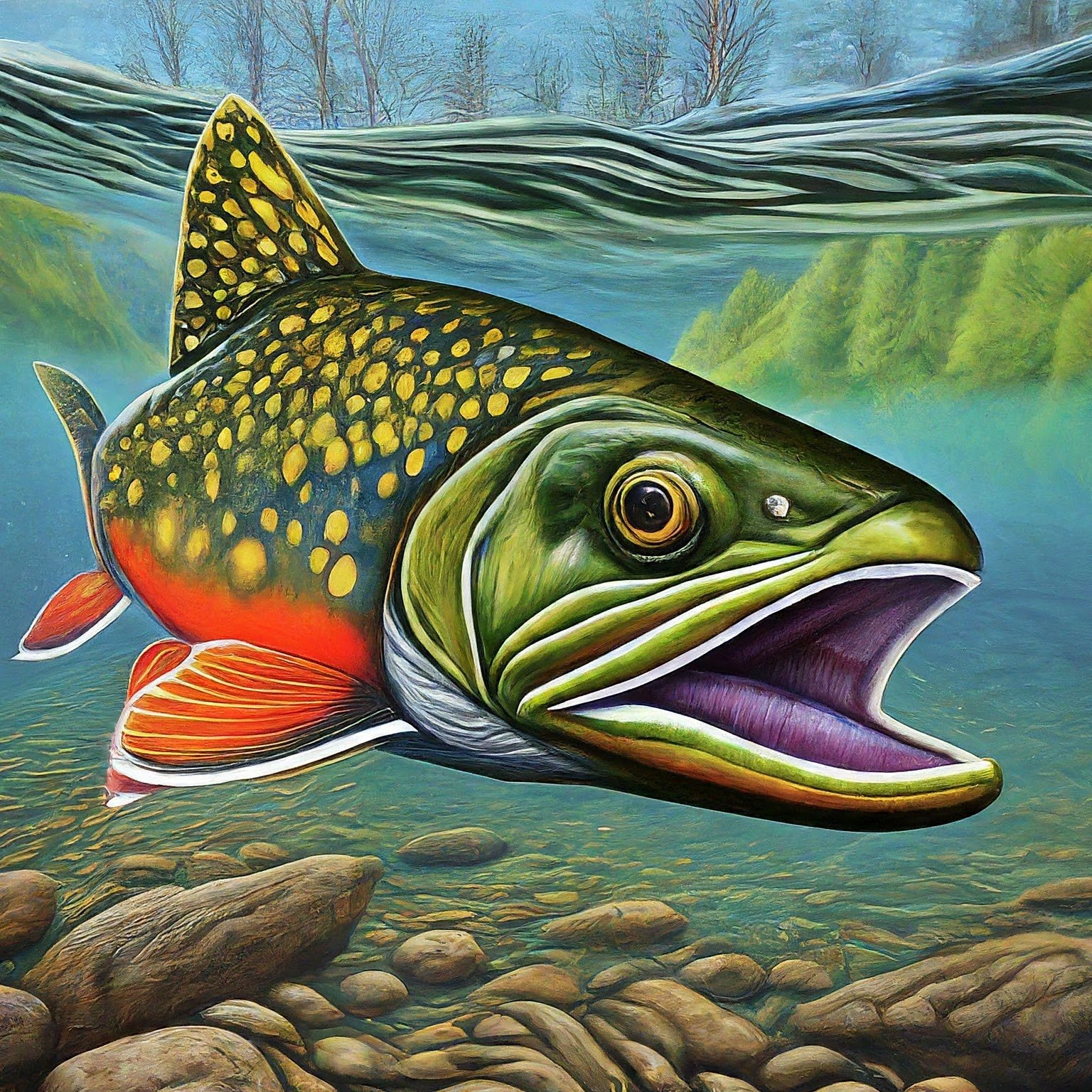The Art of Artificial Intelligence
This image of a brook trout swimming in a stream was generated using Google’s Gemini artificial intelligence software.
I came across a Facebook post this morning about an artificial intelligence (AI) generated art show being hosted by the Cultural Center of Cape Cod. Reading through the comments of the post I was struck by how polarizing the subject was. The comments were visceral and thought provoking.
“A call for art for plagiarism? This is really sad.“
“Algorithms don’t create, they just regurgitate stolen work”
“AI art is theft.”
“Shame on you for putting an art show together promoting AI generated art … being created by people who are NOT artists or creative professionals.”
“If everyone is an artist, then no one is.”
“AI is not art.”
“This is abhorrent! A pathetic and immoral cry for relevance by an institution that should know better.”
Such strong opinions suggest that the Cultural Center of Cape Cod had struck a nerve in hosting the show, evoking just the sort of topical discussion they had desired. The reactions also suggest that AI and art would make an excellent topic for a blog post.
Artificial intelligence is here. It is permeating almost all aspects of our lives including pharmaceuticals, healthcare, transportation, finance, and journalism. There’s likely not a field or profession that won’t somehow be impacted by AI over the next decade. Art and culture are not to be excluded. But what does that mean, and why do people have such visceral reactions against the integration of AI into arts and culture?
The comments above reflect a fear of AI-generated art, a presumption that somehow it’s not quite real, and that it’s stealing from ‘real’ artists. Admittedly, AI-generated art is built on the backs of other images including the artwork and photography of real people. Pablo Picasso is oft quoted as saying “good artist borrow, great artists steal.” Essentially - mediocre artists merely try to imitate other artists (borrow their style), but a great artist studies the work of other artists and integrates it as their own (steals their style for their own). Is what artificial intelligence does no different? But does that somehow dilute its impact on the observer, the consumer of said ‘art’?
A nature photographer working with digital media can capture a fleeting moment under the perfect light - it is not something that they themselves create - it’s a product of nature - but skillfully using the tools of their trade they are able to capture imagery that evokes a human response in the viewer. Any photographer will tell you that their ‘art’ is not just in capturing images, but deciding which of their many photos they take will make the cut for public consumption. Which of the photos will evoke a human reaction and stir the soul - which ones contain ‘art’? Part of the creation of art is having the artistic capacity (an ‘eye’) to filter out art from non-art. Is this no different than what someone does when producing AI-generated art?
I am not an AI-generated art advocate. I am however, an advocate for art, and I’d argue that AI-generated art has a seat at the ‘art’ table. I am a colored pencil artist and my original products are about as analog as they come - with pencil in hand I physically draw my subjects on paper. But at some point in the digitizing process I know that the software I use as tools of my trade utilize artificial intelligence to make them more intuitive, more user friendly, more efficient … to make them better. But at what point does the utilization of artificial intelligence in my practice pollute my product? Should I somehow be afraid of artificial intelligence generated art as a threat to my existence as an analog artist?
The purists seem somehow threatened by the existence of digital tools. As I see it artificial intelligence is no different than any other digital tool, similar to digital photography. Is the painter who uses a digital camera to digitize their prints committing adultery? Personally, I’ve stopped worrying about the creation side of what makes art. I create the way I do because I can, and because I want to. But I don’t necessarily create art - it doesn't become art until it reaches the consumer - it’s inside the art consumer where the human spirit is stirred, a new emotion is evoked, or perspective gained. Does it necessarily matter how the art was created or does it matter more what feelings that art can evoke?
The secret to artificial intelligence lies where it reaches humanity. Is AI-generated art capable of evoking the human spirit? And if so, does it make it any less artistic than other forms of ‘art’? I sense that these are societal questions - things that many people have opinions about, but no one person holds the answer. I also suspect that the societal perspective on the topic will evolve as the technology advances and becomes more familiar.

